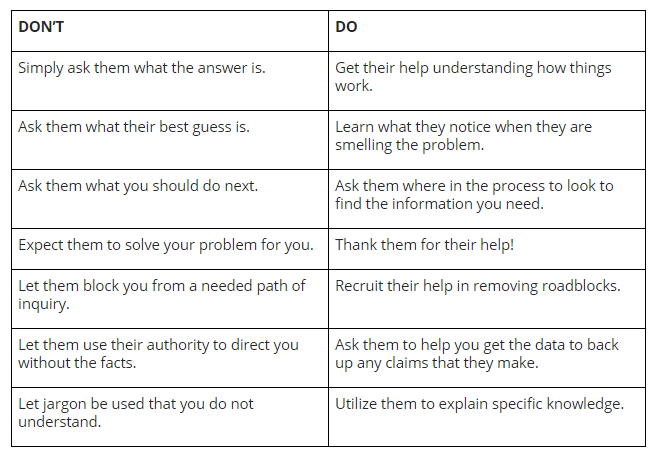Don’t Rely on Experts
Episode #6 of the course Problem solving by Nat Greene
Intrepid problem solvers,
Yesterday we talked about digging into the fundamental science and the initial principles of your problem. This can be intimidating! When solving hard problems, you are going to encounter something you don’t know or understand. Sometimes the science will be too far out of your training or knowledge to absorb it quickly. In moments like these, you will probably want an expert to help.
While they can be critical to helping you solve a hard problem, a lot of people mistakenly rely on them too much. This gets them into trouble.
Why People Rely on Experts
People often rely on experts when they are not confident they will make quick progress while solving a hard problem. Typically, they believe it will be a quicker, easier, and safer path. They’ve had experiences where SMEs have solved easier problems and now assume they are facing a similar set of circumstances.
Sometimes people also hope the expert will give them political cover. This cover can protect a team or leader from outside regulators, internal scrutiny, or a boss. Bringing in an expert demonstrates you are taking action.
The Pitfalls of Relying on Experts
Once an expert decides something, it can be very difficult to challenge their decision. However, sometimes they get things wrong or head down an unproductive path, which is much more likely to occur when working on hard problems. When you ask an expert to solve the problem for you rather than help you understand specifics, you become entirely reliant on them.
Asking them to just solve your hard problem for you is unlikely to lead to a beneficial solution. There are three factors that can put experts in a particularly bad position to be great problem solvers for you or your organization:
1. The expert may feel they need to come up with a quick answer.
2. The expert may be misaligned.
3. The expert has the “curse of knowledge.”
Rapid Answers. The first danger to relying on an expert is their reputational need to have a rapid answer. “Hey, we brought you in and you are the expert in the field. What is the answer?” This pressures an expert to guess at a solution right away. If you ask an expert to guess at a solution for you now, they will probably give you their best guess rather than say, “I don’t know”: don’t put them in that position.
Misalignment. Second, there is often a basic conflict of interest between an expert and you or your team, regardless of whether the expert is internal or external to your organization. A basic example is a vendor. How they get paid may color their view of the solution they think you need, and they may just be excited to sell you something. Generally, if they are spending your money, their incentives will differ from yours.
Curse of Knowledge. Another danger of relying on subject-matter experts is that their extensive experience can be a mental hindrance to solving a unique, hard problem. According to “The Curse of Knowledge” by Carl Wieman, the “curse of knowledge” is a cognitive bias that leads people who are highly informed about a topic to be unable to think about it in a new way with a fresh pair of eyes.
How Great Problem Solvers Utilize Experts
The first rule in working with experts is stop asking them to solve your problem. Don’t ask them, “What’s causing this?” Rather, ask them to help you understand how something works. Get them to point you in the right direction for the resources you need to understand the system.

Position them with clear expectations about how they are going to help you, the problem solver. If you get that right, things will go smoothly.
Stay tuned tomorrow to learn about the magic of believing in a simple solution.
—Nat
Recommended video
Recommended reading
The Curse of Knowledge, or Why Intuition About Teaching Often Fails by Carl Wieman, where you will learn why expertise can sometimes be a drawback.
Share with friends

